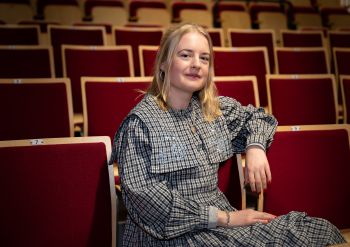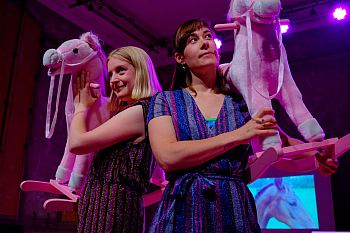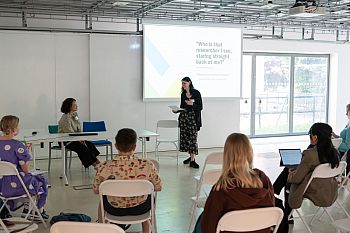Broadcast: News items
Spotlight on Researchers: Tiffany Murphy
Posted on behalf of: Sussex Researcher School
Last updated: Thursday, 27 March 2025

Trigger Warning: themes of sexual violence
- Video Transcript
-
[MUSIC: Soft Pulse Synth]
[TITLE CARD: Animated image of a black hanging lamp with a light yellow ray of light coming from it. Inside the ray of light the text 'Spotlight on Researchers' appears. Background is sunshine yellow.]
Trigger Warning: themes of sexual violence
Tiffany Murphy:
Hi, I'm Tiffany Murphy, and I'm a postgraduate researcher in Drama, Theatre and Performance in the Faculty of Media Arts and Humanities. And my doctoral research project 'On the Mend: Engaging with sexual and gender trauma in feminist performance' looks to develop reparative and ethical frameworks for theatre to better deal with lived stories of sexual violence narratives.
[END CARD: Black hanging lamp with light yellow ray of light. Inside the ray of light the text 'Interview by the Sussex Researcher School'. Background is deep aquamarine with a strip of sunshine yellow at the top.]
The Journey to a PhD
Before I started my PhD, I was a theatre practitioner, working with international collaborators, creating and touring nine performances. I did a piece called Anne Meets Jeffrey, which we worked on and toured around the UK and Europe between 2015 and 2019. The performance was shaped by my collaborator’s experience of sexual violence and explored how we tell these stories on stage. It did well, professionally speaking, but it was a very challenging experience overall.
As we started our show before the rise of the #MeToo movement, we witnessed the impact that it had on theatre programming. Initially, our piece did not have a lot of commercial viability, but this changed rapidly and there was a kind of rush of theatres putting these stories on stage. Unfortunately, there was a lack of informed practice around trauma-informed support, audience care, and artist care. It was a hard environment to be working in.
After finishing the tour, I knew I wanted to do more in this field but in a different way. Performing and (re)experiencing these stories was too demanding, so as an artist, I was confused about what to do instead. I realised during lockdown that I needed a break from the embodied nature of performance and the demanding task of doing it repeatedly. I wanted to do something but at more of a distance and felt that research provided that opportunity.
The Research
My research looks at different experiences and types of trauma, including direct experiences of sexual violence and the ‘collective’ experience of insidious trauma. Trauma is both an individual experience and a cultural one that can dominate aspects of everyday lived experience. Insidious trauma describes the everyday traumatising experiences of living with oppression. It suggests that in societies with high rates of sexual violence and misogyny, women are traumatised by the fear of such violence. In light of this, traumatic stories need to be shared responsibly to offer genuine survivor support and solidarity.
I'm exploring how theatre can engage with stories of trauma, particularly sexual violence narratives, in more responsible and restorative ways. Theatre creates a shared live community, so creating an experience that supports both the audience and the artists is important. Therefore, I’m developing frameworks that place feminist care ethics and trauma-informed practice at the forefront.
Failure as a concept plays a significant role in performance studies, recognising the ‘failure of representation’. Theatre can’t truly repeat an event, and exposing the breakdown of representation (e.g. artifice) can open up new possibilities. Adopting the strategies of failure, I'm analysing performances that deal with trauma, which is also understood to be unrepresentable.

Specifically, my research adopts a queer feminist lens of ‘failure’, which examines situations where choosing failure can be enabling. I use failure theories as a framework to acknowledge that traumatic experiences often cause long-lasting damage, and that repair does not necessarily mean that something has returned to its original state. Neoliberal narratives around healing and resilience aren't helpful for trauma recovery. Recognising the break and finding a different way to live with the unending experience of trauma can be hopeful. Building on these theories, I explore the value of adopting failure for not only performing trauma but living with it.
Working in this field, there are real risks around public engagement and exposure, especially for researchers who have experienced abuse. It's important to be mindful of these risks and ensure that all researchers and participants are as protected and supported as possible.
It can be challenging to work with research material that reflects real-life experiences of trauma, as there is the potential for re-traumatisation and vicarious trauma. Working with difficult materials means that developing healthy working strategies is necessary. However, I find that the academic distance provided by research helps process difficult experiences through a critical lens, rather than a purely emotional response. We encounter these stories in everyday life, and doing this research helps me feel I am able to do something productive.
With colleagues from the Centre for Gender Studies, I’ve set up the Sexual Violence Research Café network at Sussex. Connecting with other researchers, collaborating across disciplines and sharing strategies has been really helpful.
Achievements and the Future
The success of my performance practice has enabled me to do my PhD. My parents didn’t go to university, so being able to pursue this path feels like a big achievement. I feel very lucky to be able to focus on something that is so important. I feel very supported at Sussex, so doing a PhD here has been a positive experience.
I received the Research Led Initiative (RLI) Funding last year and organised an interdisciplinary symposium called ‘Close to My Heart: PGR Perspectives’. The event created a space for conversations around closeness to our research, researcher positionality, and researcher self-care. It was focused on care and accessible, inclusive practice, and received very positive feedback. I was delighted to have been awarded the funding and thankful for everyone to contributed to the event’s success.

I've been very fortunate to receive the RLI again this year to build on the success of the symposium. ‘Close to My Heart: Autoethnographic Approaches’, will be held on the 18 June at ACCA and is part of the University’s Summer of Research programme. It will focus on locating points of intersection of commonality and difference through methodological approaches. It's going to be an amazing day of workshops led by PGRs, and we’re currently seeking workshop leaders via the call for participation.
I've also been appointed as a senior project officer to work on a five-year European Research Council-funded project based in MAH, led by Hannah Fields. The project is called ‘Promiscuous Print: Legal Deposit Libraries, Rejected Texts, and New Methods for Negative Bibliography’. Predominantly, it explores ‘negative bibliography’, examining collections from 19th-century literature, missing documentation and potential causes for exclusion. I'm looking forward to applying the project management skills that I've learned from running the RLI events and my other part-time roles at the University to a research project on this scale.
I'm working on a chapter for the Palgrave Handbook of Global Feminism, Theatre, and Performance. I'm really pleased to be involved in the collection. I have spoken at various conferences too.
After the PhD, I would love to pursue academia. I've really enjoyed teaching and working with other researchers. Alternatively, I have made a lot of partnerships in the theatre sector, so there is potential for impactful collaborations working on ethical practices for theatre and performance.
Interview by Shona Clements, Sussex Researcher School
Tiffany's Links
Close to My Heart: Autoethnographic Approaches
Call for Participation (Autoethnographic Approaches)
Sexual Violence Research Cafe network - if you would like to be added to the newtworks mailing list please email Tiffany - tm505@sussex.ac.uk
Content Support
If you have been affected by any of the content in this article please see below some avenues for support:
University of Sussex Report and Support
Survivor’s Network (Brighton based charity providing support for victims of sexual violence and abuse)
Are you an PGR and like to be featured in the series?
If so Apply Here

